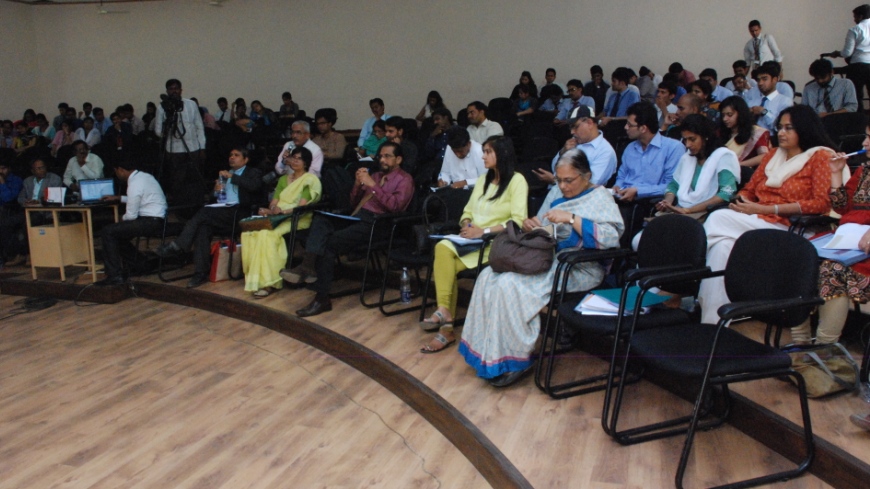
Workshop on Spiritual Pragmatics and Challenges of Transformations
World Spiritual Transformation Forum Sangam (WSTFS): Nurturing an Open Space for Mutual Learning and Transformations
An International Sangam (Confluence)
On
“Spiritual Pragmatics and the Challenges of Transformations”
Date: February 13, 2012
Time: 9:30 am to 6:30 pm
Venue: Indus Business Academy, Bangalore
Outline of WSTF
Today human survival is at a cross-road as in the name of varieties of fundamentalism—economic, religious and secular—we continue to inflict unbearable violence on each other and to our Mother Earth, a violence which is leading to self-injury and reaching a point of total annihilation. Both global warming and inter-personal, inter-group, inter-religious rage is bringing all of us to the brink of extinction. It seems at no point in recent human history the choice before us is so stark: either we live together or die together. It is in this context that there is an epochal need to build upon traditions of spiritual energies and movements for dignity, dialogue, reconciliation and beauty embodying and drawing inspirations from various spiritual traditions and continued experimentations of humanity. There is an epochal need to create a World Spiritual Transformation Forum where individuals and groups working in the field of creative, practical and everyday spirituality (spirituality which is part of our routine life process like breathing) can come together, learn with each other and be a midwife for a new world getting born in our aspirations and struggles. This also becomes a forum for spiritually engaged individuals and groups to work with seeking souls and transformative movements from around the world for making our mother Earth a place of dignity and beauty for all of us including non-human and non-animate members of this big family of ours.
World Spiritual Transformation Forum (from now onwards WSTF) is a stream in unfolding and is born of a desire to nurture a space where all of us—individuals, groups and movements—can come together, be together, energized together and be catalyst for self, social and world transformation. Spiritual is not confined to the religious but neither does it exclude it nor does it exclude science. Spirituality is a perennial journey of self, co-realization which continuously transcend known boundaries and embody strivings and struggles for dignity, dialogue, beauty and learning. It manifests itself in varieties of fields of life—religion, science, art, literature. WSTF will be a forum for sharing of new initiatives in spiritual experimentation in all these fields.
WSTF is a Forum for individuals and groups to learn with each other. It is also an open space for interested global public to engage with this in a spirit of mutual learning. At present such an open space with people from all faiths, people without faith, without belief in God and those who value life without calling themselves spiritual can come together. At present such an open space of being together and welcome is conspicuous by its absence. WSTF strives to be an open space in fact an emergent open space nurtured and cultivated by all of us coming from different religious, faiths, spiritual movements and fields of life. The only condition for belonging to such a space is a commitment to contribute our modest mite to make this world less violent and more just, renunciation of violence–physical as well as symbolic– as a mode of communication and interaction in the Forum itself (as it is in World Social Forum), and respect for each other and reverence for life and mother Earth. We are all invited to be self-critical about our tradition but not hurl abusive and disrespectful criticism of other. Our questioning of each other should spring from a deep self-questioning and WSTF becomes a nurturing soil for such a self and mutual questioning as well as nourishment and fecundation.
WSTF draws inspiration from World Social Forum which has created new energies in enabling transformation-seeking individuals and movements to come together. Religious and spiritual groups have also taken part in World Social Forum. But WSTF aspires and strives to be a much more conscious space for spiritually engaged individuals, groups and movements from different traditions of spiritual practice and experimentation to come together, learn together and interact with a seeking public.
In WSTF we plan to have a combination of activities—plenary lectures and workshops on important themes such as poverty and spirituality, violence and spirituality, practical spirituality and world religions (such as Practical Spirituality, Human Development and Planetary Realizations, Practical Spirituality and Islam, Practical Spirituality in Judeo-Christian Traditions, Practical Spirituality and Buddhism, Practical Spirituality and Hinduism etc.) We would also have events where individuals and groups would share in the form of performance their experiments such as new ways of worship and new ways of establishing connection between self, society, nature, divine and cosmos. There would also be cultural programs as well as reading and study circles of important texts such as the Quran, Bible, Bhagvad Gita and the Torah. There would also be poetry reading sessions bringing to us the rich heritage of spiritual poetry from fellow travelers like Rumi and Kabir. There would also be stalls where participating groups and individuals would present their work, especially on practical spirituality, and offer exhibitions.
Symposia: In WSTF, we plan to have two symposia: one on “Practical Spirituality and Islam” and the other on “Religion, Spirituality and Social Responsibility.” These follow our earlier and continuing dialogues on “Practical Spirituality and Human Development.”
An International Conference on Spiritual Pragmatics
In WSTF, we also plan to hold an international conference on spiritual pragmatics to explore deeply some of the theoretical and philosophical issue. On behalf of Asian Forum for Social Theory, we had an initial international workshop on it in Bangalore in Feb 2011. We share with you the accompanying outline of this for your perusal.
Spiritual Pragmatics:
New Horizons of Theory and Practice and the Calling of Planetary Conversations
Pragmatism has been an important philosophical and socio-cultural movement in the US which has influenced our view of language, social reality and human condition. American pragmatism as cultivated by C.S. Pierce and John Dewey has influenced post-war continental philosophy in the works of seekers such as Karl-Otto Apel and Jurgen Habermas. But this has not been merely a one-way influence. In the works of Apel and Habermas we see a mutual dialogue between American pragmatism and streams in continental philosophy namely Kant leading to what is called Kantian pragmatism. Kantian pragmatism has influenced critical theory. Kantian pragmatism has opened up pragmatism to new realities and possibilities as a result of dialogue between American pragmatism and continental philosophy.
But this dialogue now needs to be broadened and needs to be part of what can be called planetary conversations. There is a need for dialogue between varieties of pragmatism and also for exploring spiritual horizons of pragmatism. For example, Confucianism does have an important emphasis upon practice and pragmatism. John Dewey did visit China and got to know the Confucian streams of theory and practice. Pragmatism does also have a spiritual horizon and base as, for example, in many streams of Indian traditions there is a focus on transformative practice. In this context Sri Aurobindo in his Life Divine talks about a nobler pragmatism “guided, uplifted and enlightened by spiritual culture and knowledge.” In his Human Cycles Sri Aurobindo also talks about spiritual vitalism. Sri Aurobindo also urges us to look at language as mantra and cultivate the mantra dimension of language. This urges us to go beyond a simplistic view of language as reflection of society. This resonates with Martin Heidegger’s conception of language as way making movement. In Sri Aurobindo and Heidegger we find streams of spiritual pragmatism in their meditations on language, self, being and reality which can also inspire us to explore the spiritual struggle in Wittgenstein’s conception of form of life.
With a creative dialogue with Sri Aurobindo, Heidegger, Wittgenstein and Habermas and Dewey, we can cultivate paths of spiritual pragmatism as a new way of looking at self, society, language and reality. In spiritual pragmatism new languages and practices are born of multidimensional sadhana, strivings and struggles touching both the social and spiritual bases of life and society. Spiritual pragmatism involves interpenetration of spiritual and material, immanent and transcendence, capability and transcendence. Spiritual pragmatism involves practical discourse as suggested in the critical theory and practice of Jurgen Habermas and practical spirituality suggested in the works of Swami Vivekananda, Sri Aurobindo as well as in many transformative spiritual movements in societies and histories. Spiritual pragmatism thus contributes to strivings for realization of non-duality as an ongoing sadhana and struggle in life, culture and society. It must be noted that there is an important legacy of overcoming dualism in American pragmatism as well which we notice in the work of social philosophers such as Goerge Herbert Mead who urge us to go beyond the dualism of subject and object.
In our proposed international seminar we wish to explore further issues of spiritual pragmatics in the light of concerns shared above. We want to explore the following issues as starting points for further dialogues and planetary conversations:
a) Spiritual Pragmatics: Exploring its contours in histories of philosophies, spiritual traditions as well in societies and histories;
b) Spiritual Dimension of both American Pragmatism and Kantian pragmatism exploring especially the spiritual horizons of works of savants such as John Dewey and Jurgen Habermas
c) Pragmatism and Planetary Conversations: Dialogue between different pragmatic traditions of humanity such as Confucianism, Indian traditions of practice, American pragmatism and continental pragmatism
d) Spiritual Pragmatics: Rethinking our Conception of Language and Social Reality
e) Spiritual Pragmatics and Literature: exploring further the relationship between theory of symbol coming from Sri Aurobindo and the theory of indexical symbol coming from Pierce
f) Spiritual Pragmatics: Sri Aurobindo, Martin Heidegger, Wittgenstein and Derrida
g) Spiritual Pragmatics: Practical Discourse and Practical Spirituality
h) Spiritual Pragmatics and the Contemporary Challenges of Theory and Practice exploring contemporary developments in cognitive sociology, life sciences and new neurology
i) Spiritual Pragmatics and the Calling of a Post-Secular Society: Overcoming the Pathology of Reason and Religion and Nurturing Spaces of Healing
j) Spiritual Pragmatics and Practical Gandhi
